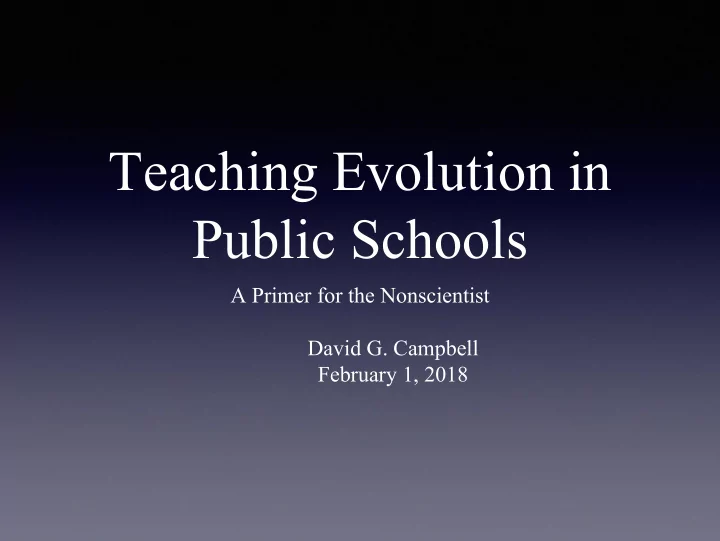

Teaching Evolution in Public Schools A Primer for the Nonscientist David G. Campbell February 1, 2018
Science The intellectual and practical activity encompassing the systematic study of the structure and behaviour of the physical and natural world through observation and experiment . (Oxford English Dictionary)
SC.912.N.2.1: Identify what is science, what clearly is not science, and what superficially resembles science (but fails to meet the criteria for science). – 2008 Next Generation Sunshine State Standards for Science
Law A descriptive generalization about how some aspect of the natural world behaves under stated circumstances. (National Academy of Sciences)
Hypothesis A proposed explanation made on the basis of limited evidence as a starting point for further investigation. (Oxford English Dictionary) A tentative statement about the natural world leading to deductions that can be tested. (National Academy of Sciences) A prediction that can be tested. (D.G. Campbell)
Theory A well-substantiated explanation of some aspect of the natural world that can incorporate facts, laws, inferences, and tested hypotheses. (National Academy of Sciences)
“…theories are the end points of science. They are understandings that develop from extensive observation, experimentation, and creative reflection. They incorporate a large body of scientific facts, laws, tested hypotheses, and logical inferences.” – National Academy of Sciences, 1998
Laws Describe. Theories Explain.
The Standards SC.6.N.3.1 Recognize and explain that a scientific theory is a well-supported and widely accepted explanation of nature and is not simply a claim posed by an individual. Thus, the use of the term theory in science is very different than how it is used in everyday life. SC.7.N.3.1 . Recognize and explain the difference between theories and laws and give several examples of scientific theories and the evidence that supports them.
Origin of Life The natural process by which life arises from non-living matter, such as simple organic compounds. (A. Oparin1938)
Evolution …changes in the heritable traits of a population of organisms as successive generations replace one another. (National Academy of Sciences)
Natural Selection Differential survival and reproduction of organisms as a consequence of the characteristics of the environment. (National Academy of Sciences)
“Nothing in biology makes sense except in the light of evolution.” – Theodosius Dobzhansky
• Evolution is observed. It happens. Fact. • Natural selection is the theory part of evolution. It is one explanation (the main one) of how evolution happens. • Within the scientific community there is no controversy about evolution. Any controversy is in the social/political/theological domain.
FYI I • 38% of Americans accept that human evolution happened without intervention by a deity. • 19% believe that human evolution was partly directed by a deity. • 38% believe that humans did not evolve but were created by a deity.
FYI II • 9% of Americans believe that U.S. astronauts did not land on the moon. (Gallup 2017) • 6% believe that vaccines cause autism and 50% are unsure. (Gallup 2015) • 30% believe that climate change is caused entirely by natural phenomena. (Yale University 2017)
Florida Next Generation Sunshine State Standards for Science Standard 15 A. The scientific theory of evolution is the fundamental concept underlying all of biology. B. The scientific theory of evolution is supported by multiple forms of scientific evidence.
Why we don’t/can’t teach creationism in science classes. • Creationism is not testable. • There is no experimental evidence supporting it. • It does not explain the world as well as evolution does. • It violates the establishment clause of the 1st Amendment to the Constitution.
Court Cases Supreme Court of the United States, Epperson v. Arkansas, 1968 Supreme Court of the United States, Edwards v. Aguillard, 1987 District Court for the Middle District of Pennsylvania, Kitzmiller v. Dover Area School District, 2005
Why we don’t/can’t teach creationism in science classes. • We do not present the Christian side or the Jewish side or the Buddhist side or … • We teach sound science. It isn’t deceptive. It is supported by data and testing.
Selected Reading • Miller, Ken. Only a Theory. 2008. • Collins, Francis. The Language of God. 2006. • Turney, Chris. Bones, Rocks and Stars. 2006. • Gould, Stephen Jay. Rocks of Ages. 1999. • Ayala, Francisco. Am I a Monkey. 2010
Recommend
More recommend